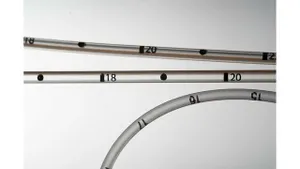Middle Eastern processor sees future tied to top equipment
Plastics processor JRD International (Jebel Ali Free Zone, Dubai, U.A.E.) says it saw from the outset that if you don’t go for the best you might as well not even consider starting up.
October 28, 2008
Plastics processor JRD International (Jebel Ali Free Zone, Dubai, U.A.E.) says it saw from the outset that if you don’t go for the best you might as well not even consider starting up.
Part of India’s Manikchand Group (Pune), JRD International, which started operations in 2000, sees a hot market for food and beverage packaging in the Middle East and Eastern Africa, says Piyush S. Shah, development manager. With a staff of 280 operating around the clock, the 100 million Dirhams ($27 million) turnover/yr company is exporting all of its annual output, 70% of which winds up in Gulf Cooperation Council (GCC) countries.
Shah says that as a result of a visit to K 2004, the world’s largest plastics exhibition (Düsseldorf, Germany), JRD management saw good opportunities in in-mold labeling (IML) for the region. Previous use of the technology was limited to IML packaging being imported from Turkish suppliers. “We asked ourselves why our region should have to rely on such imports when we have the ability to produce the same or better quality here in Dubai,�” he says.
Yet Michael Gregory, assistant commercial manager at JRD, admits that such quality packaging was at the beginning not in demand in the U.A.E. Consequently, the company really had to create the demand.
Multinationals were the first to jump on the IML bandwagon and when local dairy producers saw that IML packaging was able to stimulate the market, they, too, joined in. Following the initial acquisition of two Swiss-made Netstal injection molding presses for the IML process, JRD says it is now able to concentrate on eye-catching graphics along with thin-walled containers that offer consumer appeal. Why Netstal? “You have to go with the top from the beginning to create a market,” Shah says. “We’re less worried about competition since the Middle Eastern demand for food products is growing tremendously.”
Business is so good that the present plant is bulging and JRD is looking for a 100,000m2 site in order to expand, hopefully by 2010, he says. Today, 15,000 tonnes/yr of polymer is converted and Shah says he expects the company to double its output as new equipment is installed. Besides injection molding, the company operates four extruders, two of which target coextrusion, producing polystyrene sheet for thermoforming and polypropylene and APET film for trays and modified-atmosphere packaging.
Another hot market the company is going after is that for blowmolded bottles up to 5L for edible oil, juice, and flavored water. The processor operates five injection stretch blowmolding machines from Aoki Technical Laboratory (Nagano-Ken, Japan) and says it is seeing not only continued growth in family-sized packaging in the dairy, juice, and water sector, but also in more individual sizes as the mobility of consumers in the Middle East increases. “The lifecycle of container shapes in this market is very fast,” says Shah. JRD keeps a large stock of container and cap-and-closure molds on hand at the facility. A 3500m2 warehouse, capable of storing up to 3000 pallets, is necessary to hold the two-month supply of resin stock needed because, Shah says, there is a trend among customers to order smaller lots of processed goods.
Shah says the future looks good and he is optimistic that food and beverage container demand won’t slow down even if other sectors may see some bumps in the road.
You May Also Like


